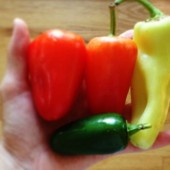Some cooks prefer to prepare food as naturally as possible. Pie dough with a food processor? Bread dough with a standing mixer? Not a chance. Isn’t that what your hands are for? To pinch flour and water together, and feel the weight of the ingredients in your hands, just as your ancestors did for millenniums before you?
For better or worse, I am not one of these people. I’m an efficiency junkie and rely heavily on modern day kitchen innovations. I’m an owner of every tool for every need – cherry pitters, avocado slicers, vegetable noodle spiralizers, stovetop smokers, handheld smokers…would you like me to continue? For the record, Julia Child had the very same vices, so if you include yourself in the “technology-dependent” camp, you’re in good company.
With all of this technology talk, you’d probably assume that I was an early adopter of one of the high-tech blenders that flooded the market in recent years.
But I held off, and for good reason.
We had a blender, and a high-priced one at that, courtesy of our wedding registry. Soon after our engagement, I’d walked through Crate and Barrel with a handheld version of a supermarket checkout scanner, price shooting SKUs with eager abandon.
But this was back in 2004 when Vitamix (and its descendents) hadn’t yet captured the hearts and wallets of health fanatics everywhere. The first time that I heard about one of these high-speed blenders was years later through a friend of mine, who waxed poetic about its nutritional benefits. Despite her protestations, I stuck to my old machine, resigning myself to a blender that produced a fine margarita, but would cower if confronted by a raw beet in a dark alley.
The turning point in my newbie juicing career came when I became part of the Instagram community two years ago. And my – what juices and smoothies these vegan, paleo, gluten-free and other health fanatics were making: Vegetables, herbs, fruit, bee pollen, spirulina, and maca powder? XO Jane addressed the issue with the eloquently-titled “Let’s talk about the weird sh*t I put in my blender”. Clearly, I was behind the times. All the cool kids were doing it; it was high time that I got myself out of the dark ages and invest in a blender that could pulverize a chain link fence along with my daily allotment of frozen berries.
I did my research – Vitamix was the market leader, with a price tag to match. But one that I kept hearing about – Blendtec – was delivering equivalent results with a significantly lower cost.
And it came in red, my favorite color.
I jumped on the bandwagon, ordered my Blendtec, and opened it with a weepy glint in my eye. And as so often happens with any new purchase, it sat on my shelves, neglected and unloved, for 5 months.
This is a pattern, and – whether you call it technophobic or lack-of-time-aholic – it’s a problem. I’m always giddy to make the purchase on Amazon, and dread the unpacking/setup process.
The issue, by the way, is purchase-agnostic. It could be a cable for my computer, a new backup drive, even a highly-desirable a new flash for my camera. No matter how much I want or need the product in question – if there is any assembly required (defined as something that needs any effort beyond extraction from a box), I hide my little treasure and pretend that it doesn’t exist. I’m guessing that many share this illness; own up if you’re a member of this unfortunate crowd. Maybe we should form a support group.
The good news is that despite the Canon Speedlite flash that remains in my underwear drawer, I managed to break out the blender for the first time last week. And like the experience with my new DSLR camera, when I finally used it, I could barely contain my whimpers of disbelief. Whole beets, whole ginger roots, whole pears with their core – all were annihilated within seconds. In the spirit of full disclosure, I did have to hold the blender down with both hands lest it fall off my counter – the motor made it jump like my three-year-old in a bouncy castle.
But the result was a smooth, nutritionally-dense beverage that I could feel good about drinking. If you add ice or yogurt, you’d have more of a smoothie, but I was shamelessly trying to knock off my favorite red juice from Organic Avenue. Which required a little more elbow grease in the form of a strainer, but was well worth the effort.
So this is less about using an exact recipe, more about encouraging you to get your appliances out of the cabinet. Use them, play with them, get to know them on a first-name basis. It’s all part of the fun of being in the kitchen. And if you’d like to make this red juice exactly, the recipe is below. In the meantime, I’m vowing to unbox that stovetop smoker. And you’d better hold me to it.
- 1 pineapple, peel removed (core is useable)
- 2 beets
- 2 large carrots
- 1 pear
- 1-inch knob of ginger
- 1 blood orange (peel removed)
- 1 lemon (peel removed)
- ½ cup of pomegranate juice
- In a powerful blender (e.g. Vitamix or BlendTec) blend the fruits, vegetables and pomegranate juice. You may have to do this in batches to accommodate all of the fruit and vegetables. You can drink the beverage as is, or if it’s too grainy/thick, you can strain it to give you a thinner juice.
- If straining, pass the juice through a strainer, using a spatula to help the process along. You’ll end up with 4 cups of red juice, and a few cups of juice pulp (which can be used for all sorts of other uses – google for more info)













Thanks for the encouragement. I have a new, untouched food processor sitting all shiny and happy in my kitchen drawer. I vow to use it this week.
By the way, your photos are beautiful.
Thanks and you will love it once you break it out!
Congratulations and enjoy your new toy! I use my Blendtec everyday and love it!!!
Had no idea that you’re a blendtec girl, I’m obsessed with it!
Looks pretty good, but I can only take so many beets at a time.
Oh, I kneaded dough for almost twenty years to make our bread. Ten years ago, my husband got me a KitchenAid. I am so happy I have it.
wooow…all the good things in one glass..I usually eat the fruit as it is, but putting them all together must have boosted up the flavor. TFS 🙂
Hello, this weekend is nice in support of me, since this occasion i am reading this enormous informative post here at my house.
If you are going for most excellent contents like myself, just pay a visit
this web page every day for the reason that it gives quality contents, thanks